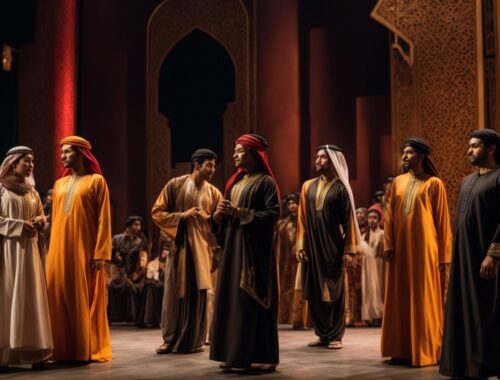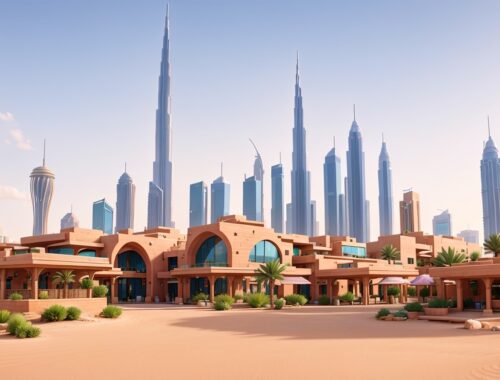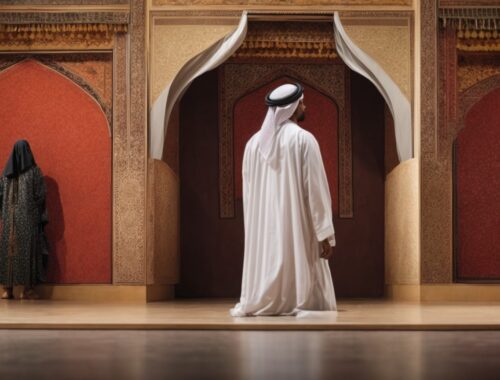
Dubai’s Thriving Theatre Scene: A Cultural Explosion
In the heart of the United Arab Emirates, a city known for its towering skyscrapers and luxurious lifestyle is experiencing a cultural renaissance that few could have predicted. Dubai, long associated with opulence and modernity, is now home to a burgeoning theatre scene that is captivating locals and tourists alike. This unexpected cultural explosion is transforming the city’s identity and challenging preconceptions about art in the Middle East.
The Unlikely Stage: Dubai’s Theatrical Metamorphosis
Dubai’s journey from a small fishing village to a global metropolis is well-documented, but its evolution into a theatrical hub is a tale less told. In 2010, the city had only two dedicated theatre spaces. Fast forward to 2024, and Dubai boasts over 20 state-of-the-art venues, ranging from intimate black box theaters to grand opera houses. This 900% increase in theatrical spaces within just 14 years is a testament to the city’s commitment to cultural development.
The Dubai Opera, opened in 2016, stands as a crown jewel in this transformation. With its dhow-shaped architecture, it pays homage to the city’s maritime history while hosting world-class productions. In its first year alone, the Dubai Opera welcomed over 200,000 visitors, a number that has since grown to an average of 350,000 annually.
Beyond the Glitz: Grassroots Theatre Movements
While the grand venues capture headlines, it’s the grassroots movements that are truly shaping Dubai’s theatrical landscape. The city has seen a 300% increase in community theatre groups since 2015, with over 50 active ensembles performing regularly. These groups, often comprised of expatriates and locals alike, are pushing boundaries and introducing diverse narratives to the stage.
One such group, “Desert Voices,” founded in 2018 by Emirati playwright Fatima Al Mansouri, has gained recognition for its provocative productions addressing social issues. Their play “Veiled Whispers,” which explores women’s rights in the Gulf, sold out 15 consecutive shows in 2023, a feat unheard of for a local production just a few years ago.
Multicultural Melting Pot: Dubai’s Theatrical Fusion
Dubai’s unique position as a multicultural hub is reflected in its theatre scene. The city’s stages have become a melting pot of global influences, creating a theatrical tapestry unlike any other in the world. In 2023, productions in Dubai were performed in 17 different languages, with English, Arabic, Hindi, and Tagalog being the most common.
This diversity is exemplified by the annual “Mosaic Festival,” launched in 2020, which showcases performances from different cultural backgrounds. In its fourth year, the festival attracted over 50,000 attendees and featured 80 productions from 30 countries, making it one of the most diverse theatre festivals globally.
Innovation Takes Center Stage: Technology in Dubai Theatre
Dubai’s penchant for innovation extends to its theatre scene. The city has become a testing ground for cutting-edge theatrical technologies. The “Al Wasl Dome,” part of the Expo 2020 site, has been repurposed as a 360-degree immersive theatre space, capable of hosting up to 3,000 spectators. Its first production, “Celestial Symphony,” utilized AI-generated visuals and real-time audience interaction, setting a new standard for immersive experiences.
Moreover, virtual reality (VR) has found its way into Dubai’s theatrical repertoire. The “VR Theatre Lab,” established in 2022, has already produced three VR plays, allowing audiences to experience performances from multiple perspectives simultaneously. This initiative has attracted global attention, with theatre companies from London and New York expressing interest in collaborations.
Educational Overture: Nurturing Local Talent
The sustainability of Dubai’s theatre scene relies heavily on nurturing local talent. Recognizing this, the city has invested significantly in theatre education. The Dubai Institute of Performing Arts, founded in 2019, has seen its enrollment grow by 200% in just five years. The institute offers programs in acting, directing, and technical theatre, with a focus on blending traditional Middle Eastern storytelling techniques with contemporary global practices.
Furthermore, a pioneering initiative launched in 2021 introduced theatre studies to the curriculum of 50 public schools in Dubai. This program, reaching over 20,000 students, aims to cultivate a new generation of theatre enthusiasts and professionals.
Economic Encore: Theatre’s Impact on Dubai’s Economy
The flourishing theatre scene is not just a cultural boon but an economic one as well. A 2023 study by the Dubai Culture and Arts Authority revealed that the performing arts sector contributed AED 1.7 billion (approximately $463 million) to the city’s economy in 2022, a 15% increase from the previous year. This growth has led to the creation of over 5,000 jobs in the sector, ranging from performers and technicians to administrative and support roles.
Moreover, theatrical tourism is on the rise. The Dubai Tourism Board reported that 8% of tourists in 2023 cited attending a theatre performance as one of the primary reasons for their visit, up from just 2% in 2018. This trend has prompted hotels and tour operators to create theatre-centric packages, further boosting the sector’s economic impact.
Curtain Call: Reflecting on Dubai’s Theatrical Journey
As Dubai’s theatre scene continues to evolve, it’s clear that this cultural explosion is more than just a passing trend. It represents a fundamental shift in the city’s identity, moving beyond its reputation for luxury and excess to establish itself as a global cultural hub.
The success of Dubai’s theatrical renaissance can be attributed to a unique combination of factors: substantial investment in infrastructure, a diverse and enthusiastic audience, innovative approaches to production, and a commitment to nurturing local talent. This holistic approach has created a sustainable ecosystem that is likely to thrive for years to come.
However, the journey is far from over. As Dubai’s theatre scene matures, it faces the challenge of balancing commercial success with artistic integrity, preserving local cultural heritage while embracing global influences, and maintaining its momentum in a rapidly changing world.
In conclusion, Dubai’s thriving theatre scene is a testament to the city’s ability to reinvent itself. It stands as a shining example of how culture can flourish in unexpected places, challenging preconceptions and creating new narratives. As the curtain rises on this new act in Dubai’s story, the world watches with anticipation, eager to see what dramatic turns lie ahead in this desert oasis of theatrical innovation.
You May Also Like

The Impact of Cultural Diversity on Dubai’s Theatre Productions
August 13, 2024
How Dubai Supports Emerging Playwrights and Artists
August 13, 2024
